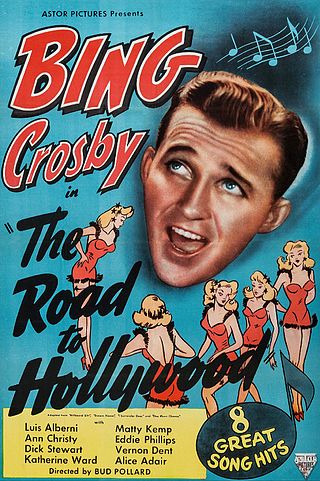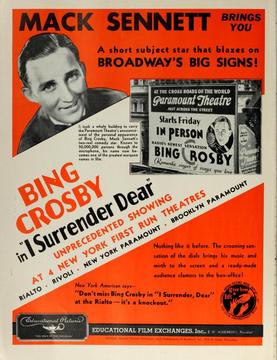
Harry Lillis "Bing" Crosby Jr. was an American singer, actor, television producer, and businessman. The first multimedia star, he was one of the most popular and influential musical artists of the 20th century worldwide. He was a leader in record sales, network radio ratings, and motion picture grosses from 1926 to 1977. He was one of the first global cultural icons. He made over 70 feature films and recorded more than 1,600 songs.

Dixie Lee was an American actress, dancer, and singer. She was the first wife of singer Bing Crosby.

"Where the Blue of the Night (Meets the Gold of the Day)" was the theme Bing Crosby selected for his radio show. It was recorded in November 1931 with Bennie Krueger and his Orchestra. The song was featured in a Mack Sennett movie short starring Bing Crosby. Crosby recorded the song on several occasions starting with the November 23, 1931 version with Bennie Kruger and his Orchestra. He next recorded it on July 20, 1940 with The Paradise Island Trio. On July 17, 1945 he recorded it with John Scott Trotter and his Orchestra and his final recording was on April 21, 1954 with Buddy Cole and his Trio for his Musical Autobiography set.
"I'll Get By (As Long as I Have You)" is a popular song with music by Fred E. Ahlert and lyrics by Roy Turk. The song was published in 1928. Versions by Nick Lucas, Aileen Stanley and, most successfully, Ruth Etting, all charted in America in 1929.
"It's Been a Long, Long Time" is a big band-era song that was a hit at the end of World War II, with music by Jule Styne and lyrics by Sammy Cahn.

Bing: A Musical Autobiography was Bing Crosby's fourth Decca vinyl LP, recorded and released in 1954.

The Rhythm Boys were an American male singing trio consisting of Bing Crosby, Harry Barris and Al Rinker. Crosby and Rinker began performing together in 1925 and were recruited by Paul Whiteman in late 1926. Pianist/singer/songwriter Barris joined the team in 1927. They made a number of recordings with the Whiteman Orchestra and released singles in their own right with Barris on piano. They appeared with the Whiteman orchestra in the film King of Jazz, in which they sang "Mississippi Mud", "So the Bluebirds and the Blackbirds Got Together", "A Bench in the Park", and "Happy Feet". They are best remembered for launching Crosby's solo career, one that would make him the greatest song charting act in history and one of the most influential entertainers of the twentieth century.

Harry Barris was an American popular singer and songwriter. He was one of the earliest singers to use "scat singing" in recordings. Barris, one of Paul Whiteman's Rhythm Boys, along with Bing Crosby and Al Rinker, scatted on several songs, including "Mississippi Mud," which Barris wrote in 1927.

Al Rinker was an American musician who began his career as a teen performing with Bing Crosby in the early 1920s in Spokane, Washington. In 1925 the pair moved to Los Angeles, eventually forming the Rhythm Boys trio with Harry Barris.
"Wrap Your Troubles in Dreams" (also known as "Wrap Your Troubles in Dreams (and Dream Your Troubles Away)") is a popular song written by Harry Barris with lyrics by Ted Koehler and Billy Moll, published in 1931.

"Nobody's Sweetheart", also known as "Nobody's Sweetheart Now" and "You're Nobody's Sweetheart Now", is a popular song, written in 1924, with music by Billy Meyers and Elmer Schoebel, and lyrics by Gus Kahn and Ernie Erdman. The song is a jazz and pop standard.
"Lies" is a popular song with music by Harry Barris and lyrics by George E. Springer. It was published in 1931.

"I Surrender Dear" is a song composed by Harry Barris with lyrics by Gordon Clifford, first performed by Gus Arnheim and His Cocoanut Grove Orchestra with Bing Crosby in 1931, which became his first solo hit. This is the song that caught the attention of William Paley, president of CBS, who signed him for $600 a week in the fall of 1931.

"Out of Nowhere" is a popular song composed by Johnny Green with lyrics by Edward Heyman and published by Famous Music. It was popularized by Bing Crosby, and was the first recording under his Brunswick Records contract. He recorded it on March 30, 1931 and it became his first number one hit as a solo artist. Crosby also sang it in the film Confessions of a Co-Ed (1931) and in his short film I Surrender Dear (1931). He recorded it again in 1954 for his album Bing: A Musical Autobiography.

The Road to Hollywood is a 1947 American film released by Astor Pictures that is a combination of several of Bing Crosby's Educational Pictures short subjects. The title was designed to draft off Paramount Pictures' "Road to..." film series starring Crosby, Bob Hope, and Dorothy Lamour; Hope and Lamour do not appear in the film.

One More Chance is a 1931 Educational-Mack Sennett Featurette starring Bing Crosby and directed by Mack Sennett. This was the second of the six short films Crosby made for Sennett and which helped launch his career as a solo performer. This film is notable for Crosby first singing on film his classic hit "Wrap Your Troubles in Dreams" which is sung to a bevy of giggling overweight Native American maidens who gradually close in on him. He also sings "Just One More Chance" which topped the various charts of the day in 1931.
Two Plus Fours is a 1930 American short film directed by Ray McCarey and featuring the Rhythm Boys. The film was shot in 5 days starting on May 29, 1930 at a cost of $19,689. It previewed in mid-June and was shipped early in July 1930.

"Waltzing in a Dream" is a 1932 song recorded by Bing Crosby. The lyrics were written by Bing Crosby and Ned Washington. The music was composed by Victor Young.
Gordon Clifford (1902–1968) was an American lyricist who wrote music for Hollywood films in the 1930s. His best-known songs include Nacio Herb Brown's "Paradise", Alfred Newman's "Who Am I?" and Harry Barris's "It Must Be True" and "I Surrender Dear".

I Surrender Dear is a 1931 Educational-Mack Sennett Featurette starring Bing Crosby and directed by Mack Sennett. This was the first of the six short films Crosby made for Sennett and which helped launch his career as a solo performer.














